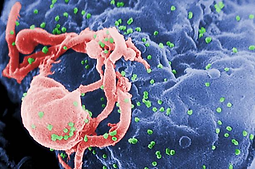
HIV / AIDS
Health Information
What is HIV?
HIV (human immunodeficiency virus) is a virus that attacks CD4+ cells, making the immune system vulnerable to infections and diseases.
CD4+ cells, or helper T cells, are a type of white blood cell that circulates through the whole body. They are essential for immune system protection.
There is no cure for HIV, but it is treatable with medicine.

Stages of HIV
There are 3 main stages of HIV. Each of the stages can last months or years.
HIV treatment can slow or prevent the progression.
Acute HIV Infection
-
The earliest stage of infection
-
Flu-like symptoms
-
HIV is multiplying throughout the body, targeting the immune system.
-
The viral load is typically very high in this stage
-
Increased risk of transmission.
Chronic HIV Infection
-
Lower multiplication levels
-
Milder symptoms
-
Without treatment, people can stay in this stage upwards of 10-15 years.
-
If a person follows their treatment plan, it is possible to lower their viral load
-
If a person still has a detectable viral load, they can still transmit HIV, even if they feel no symptoms.
AIDS
-
Acquired Immunodeficiency Syndrome
-
The late stage of HIV infection
-
Occurs if a person does not receive treatment
-
When the number of their CD4+ cells falls below 200 cells per cubic milliliter of blood.
How is HIV transmitted?
A person can only acquire HIV through direct contact with certain bodily fluids from a person who has HIV. These are blood, semen, pre-seminal fluid, rectal fluids, vaginal fluids, and breast milk.
For a transmission to occur, the HIV in the fluids must get into the bloodstream of the HIV-negative individual through a mucous membrane, through cuts, sores, or injection.
Common ways of transmission
Having vaginal or anal sex with someone who has HIV without using a condom correctly or taking medicine to prevent HIV.
Sharing injection equipment such as needles and syringes with someone who is HIV-positive.
Next Steps
Due to the broad range of symptoms, a person can only know if they have HIV if they get tested.
If you or someone you know is interested in learning more, visit Vivent Health.
Vivent Health is an organization dedicated to providing resources and advocating for people who live with HIV.
Visit their website to learn more about the next steps for HIV care:
